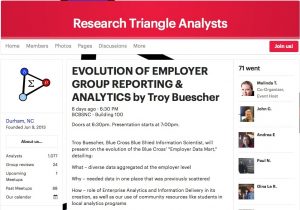Each class in the MSA program has less than a year to both master analytics and pursue our ideal job, so I want to get involved with as many diverse analytics-oriented events as possible. Overall, I’m enthusiastic about the value of several local meetups to broaden my experience with analytics.
Meetup Groups in General
Meetup groups, when focused on professional subject areas, can offer occasional gems with interesting discussion topics and networking opportunities. There are 3 meetup groups with analytics-oriented focus areas in the NCSU area:
Research Triangle Analysts
Big Data Developers in Raleigh
Analytics.Club | Raleigh
Pros of Meetups:
- Generally enthusiastic attendees – Attendees are choosing to spend their free time on these topics. They will generally entertain lots of questions, as they are excited about the topic.
- “In the trenches” presentations – Presenters typically give information on how they do something pretty specific: “This is how we use SAS and Excel to automatically generate hundreds of insurance metrics for our sales staff every month.”
- Networking for local jobs – National/international level jobs are less typical at meetups.
Cons of Meetups:
- Less polished presentations – This isn’t necessarily a bad thing, but certainly don’t expect a TED talk.
- Topic stagnation – This can occur with consistently small meetups (<25 people)
Research Triangle Analysts BCBSNC Meetup

I (and 3 other MSA ’17 candidates) attended the Research Triangle Analysts meetup held at Blue Cross and Blue Shield of North Carolina (BCBSNC) in Durham on May 17. Attendance was approximately 75 people, with perhaps a quarter of that being first timers. Prior to the main presentations, a few introductions and general announcements were made and employers/recruiters were asked to announce any jobs that were currently available for analytics-oriented positions. Several folks announced new positions being recruited, which was great to see. Overall, between the meetup itself and the informal beer session afterwards, I heard about approximately 15 local area job openings.
The meetup presentation was given by Troy Buescher, information scientist at BCBSNC. Slides were somewhat evenly split between the actual analytics methods/software and interesting healthcare tidbits (results) of the analysis that Troy performed. I found the presentation very well put together and quite interesting on several levels:
- Troy presented a decade-by-decade historical perspective of both healthcare costs and the format of the data available during that decade. For example, 1960’s healthcare costs were a few hundred dollars per year per person, and data was available as hard copy paper, generated on a typewriter. Contrast that to today’s costs of many thousands of dollars per year per person and data residing in terabyte-sized storage servers.
- Troy discussed how the ability to properly analyze the data was only possible after assembling data into a common data warehouse with all of the information in one location. He presented lots of details on the software used (SAS/Excel/various frontends), what tools were already available, and what solutions needed to be newly written to get things to a highly automated state.
- Several challenges were encountered when trying to create the data warehouse. Management had to be convinced of the value of the cost/time needed to create the system. There were also implementation challenges between the IT and Analyst groups on what the system needed to look like and how to structure it for the best usability. Ultimately, at BCBSNC, the analysis-side folks created the initial “pilot use” system to work out the kinks, and IT will eventually create a “production ready” toolset to make the system more robust and useful for larger groups of people in the company. Interestingly, BCBSNC is still in the “pilot” phase, even after 7 years of increasingly obvious value-add from this tool.
- Troy showed lots of interesting healthcare trends, much of which was obvious (i.e. costs going up), but there were many non-obvious ideas on how to reduce healthcare problems and lower costs. A BCBSNC colleague mentioned the desire to generate predictive analytics models, then test those analytics with real-time or historical data, and most importantly, to loop back and adjust the models to make them more accurate. When used in conjunction with healthcare improvement campaigns, or cost reduction efforts, these modeling efforts were proving to be very powerful.
- Lastly, a very positive note for our program: Troy specifically mentioned that BCBSNC completed a practicum project with the NCSU MSA program and that it was “very valuable and rewarding” for BCBSNC. He highly recommended participation in the practicum to any company that needs additional resources for a medium term project.
I hope you will join me for a future meetup or make recommendations on additional meetups of interest in the area!
Columnist: Ed Preble

